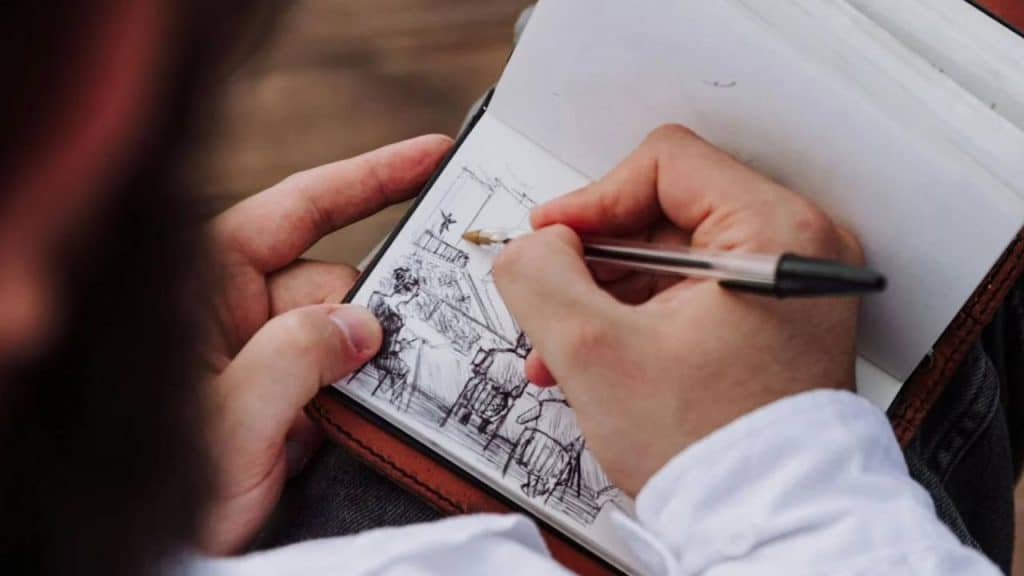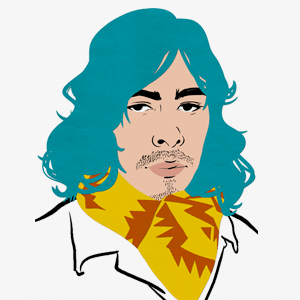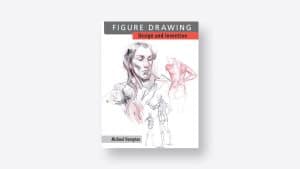The Importance of Keeping A Sketchbook

Creative business tips to kickstart your career as an artist, designer, or content creator.
For creatives of all types, sketchbooks offer a valuable tool for both the exploration and recording of the creative journey. Whether your specialty lies in graphic design, illustration, fashion, interior design, photography, web design, copywriting—literally anything, a sketchbook provides a place for exploring all of the linear and abstract lines of thought that your work involves.
A sketchbook can be anything you want it to be—a place for practice or reflection, problem-solving, or journaling. Your sketchbook is the home for those things that just can’t be communicated effectively through words alone.
Keeping a sketchbook helps you to build the habit of putting pen to paper. Being a private space just for you, the sketchbook environment is more conducive to experimentation in comparison to a blank canvas. The sketchbook’s covers provide refuge from prying eyes whereas a painting you’re unhappy with would need to be covered or hidden away.
With the exception of those created specifically for applications to schools like CalArts or Youtube videos, sketchbooks have a more casual air about them that encourages more free expression and less hesitation. There’s nothing at stake, so there’s no cost for making an error—unless it is for Youtube, in which case that weird nose you just drew just voided the whole book.

Sketchbooks also provide practice for quickly communicating your ideas. When you’re struck with an idea that you want to save for later and you’ve got to quickly jot it down before it slips away, you’re tasked with finding a way to explain it to a future version of yourself. Like anything, this is something you get better at with practice.
Looking at some of my old sketchbooks, I can see instances where I’ve both succeeded and failed to provide sufficient context. While what I managed to get down at the time may have been enough for a version of me weeks later to understand, the present version of me years later has no idea what I was thinking or meant.
As creatives, we’re communicators. We translate ideas and emotions into our work and the better we are at communicating, the more successful our work becomes. Improving at communication takes both time and repetition, and the sketchbook functions a bit like the gym where through experimentation, we can build and refine our skills. The work we put into our sketchbooks can lead to insights that inform our work in new ways and shape the direction of our careers and aesthetics.

Beyond just experimenting with different mediums and subject matters, sketchbooks should be viewed as a place primed for the development of ideas. Think of the act of recording ideas in your sketchbook as planting seeds. The notes or quick thumbnails you jot down may not be something you explore immediately, but can blossom into screenplays or murals years later when you stumble upon them while flipping through your books for inspiration. I’ve had plenty of ideas that I felt my skill level at the time prevented me from fully realizing but was able to revisit years later and flesh out my original vision.
In the same way that sketchbooks provide the fertile grounds for the cultivation of ideas, they can also be used to build the basis for understanding. For example, you might dedicate a sketchbook to your studies of anatomy. Beginning from the foundational basics at the start of the book, you can track your progress as you build your understanding, with the book as a whole serving as a valuable point of reference you can use well into the future.
Sketchbooks are equally valuable for understanding concepts that require a less linear approach. By making notes of the insights that pop into your head while performing mundane tasks like washing dishes or going for a walk, you can more effectively harness the power of the brain’s more passive, background sorts of processing. For those problems that require more time to unravel, where understanding comes about gradually, making note of insights as they happen allows you to slowly piece together a map where you can retrace your steps and connect dots retroactively.

Sketchbooks provide a place to document where you are currently for future reflection, both to see how far you’ve come and how far you have left to go. Because the pages of a sketchbook are sequenced, there’s an inherent aspect of time.
Over the days and months, as you work your way through the book, recording your struggles and triumphs and starting new books upon the completion of the last, you’ll start to see transformations in skill and thought take place. The changes that occur over its pages will reveal to you both what works and what needs work, making it an invaluable tool in your arsenal regardless of discipline.

Taylor is a concept artist, graphic designer, illustrator, and Design Lead at Weirdsleep, a channel for visual identity and social media content. Read more articles by Taylor.
RELATED ARTICLES:
SESSIONS NEWS:
ENROLL IN AN ONLINE PROGRAM AT SESSIONS COLLEGE:

























